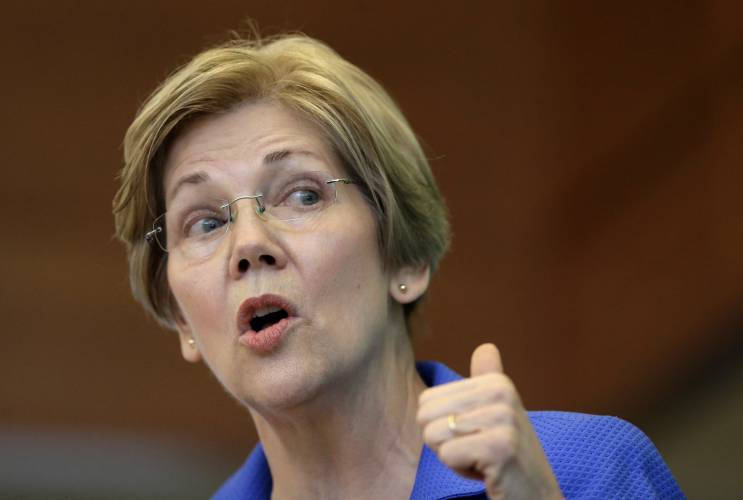Warren amplifies push for Healey housing bill

U.S. Sen. Elizabeth Warren, D-Mass. AP FILE PHOTO/STEVEN SENNE
| Published: 12-19-2023 11:20 AM |
BOSTON — U.S. Sen. Elizabeth Warren threw her weight behind Gov. Maura Healey’s housing plan this week, and said the federal government will need to “step up” to help the state address its housing affordability and availability crisis.
As many as 200,000 housing units will need to be built in Massachusetts over the next six years to keep up with housing demand, Warren said at an event hosted by the New England Council at the UMass Club in Boston on Monday.
“The problem is bad and the problem is getting worse,” she said. “Do you think that housing is in short supply in Massachusetts right now? Do you think that rents are already rising like a hot air balloon? Well buckle up for a rough ride.”
The senator was pessimistic about the slow growth of the state’s housing supply.
Massachusetts approved 17,692 units last year. Warren cited this statistic, saying it’s “not even one-tenth of the units that we need.” She added, “But just even at this rate, we can’t even hold steady on this crisis.”
Warren praised Healey’s five-year, $4.12 billion housing bond bill (H 4138), a plan that has idled before the Legislature since Healey filed it exactly two months ago, on Oct. 18. While Healey asked that the bill be passed “promptly,” lawmakers have yet to hold a hearing on it.
The bill seeks to kickstart housing production, upgrade the state’s aging and neglected public housing stock, and convert state land into housing-ready plots. It is also packed with policy proposals, including the ability for cities and towns to impose new fees on high-price real estate transactions and steer the revenue into affordable housing development, a simple majority voting threshold for inclusionary zoning ordinances and bylaws at the local level, and a new designation to address housing availability in “seasonal communities.”
Since Healey filed the bill in October, the Legislature has sent the governor’s bill to the Joint Committee on Housing, which is co-chaired by Sen. Lydia Edward of East Boston and Rep. James Arciero of Westford.
Article continues after...
Yesterday's Most Read Articles
 Greenfield homicide victim to be memorialized in Pittsfield
Greenfield homicide victim to be memorialized in Pittsfield
 Former Greenfield man granted new trial after 1995 murder conviction, walks free
Former Greenfield man granted new trial after 1995 murder conviction, walks free
 On The Ridge with Joe Judd: What time should you turkey hunt?
On The Ridge with Joe Judd: What time should you turkey hunt?
 Judge sets bail for Millers Falls assault suspects
Judge sets bail for Millers Falls assault suspects
 Franklin Tech student welds artistic bench for French King Bridge
Franklin Tech student welds artistic bench for French King Bridge
 As I See It: Between Israel and Palestine: Which side should we be on, and why?
As I See It: Between Israel and Palestine: Which side should we be on, and why?
Members of state’s federal delegation do not frequently wade into state-level bills, but Warren gave Healey’s bill a firm endorsement.
“The Healey-Driscoll administration is working to enable municipalities to pass inclusionary zoning ordinances by simple majorities, reduce barriers to the building of accessory dwelling units, and invest nearly $2 billion directly into housing development. Each of these will help reduce the affordable housing gap. Our governor knows that one-size-fits-all is not going to solve this crisis,” Warren said.
The senator called for “three cheers for Massachusetts” and Healey for “tackling the housing crisis.”
But, she added, the state can’t handle the problem alone.
“Here’s my pitch today: Massachusetts and the rest of the country should not be left to deal with this housing crisis alone,” she said. “It is time for the federal government to step up. Not to tell local governments what to do, but to be a good partner.”
With Sens. Angus King of Maine and Ron Wyden of Oregon, Warren has proposed a minimum corporate tax on “billionaire corporations.” It would require that companies that report over $1 billion in profits to shareholders pay at least a 15% tax rate on those profits. The tax would apply to roughly 200 companies, and generate hundreds of billions in revenue over ten years, according to Warren’s office.
The senator on Monday said this tax could be used to stimulate housing supply through federal investments.
“The federal government should invest because housing connects to many other issues that the federal government directly pays for. We know, for example, that access to adequate housing reduces health care expenses for the Medicaid population. Increasing the supply of affordable housing will reduce money spent in emergency rooms,” she said.
Warren said she uses her position on the Senate Banking, Housing and Urban Development Committee to push for more federal funding for housing, but that “it’s an uphill battle.”
“Many of our Republican friends, and some Democratic friends, don’t want the government in this space. Even so, you don’t get what you don’t fight for, and I’m fighting for a bill to inject over $40 billion a year into the construction of affordable homes,” she said.
The senator has pushed high-dollar affordable housing legislation for years.
She said the $40 billion investment could be used to create incentives for municipalities to modernize building codes and improve zoning, to help decrease the cost of building new housing.
“Outdated, duplicative building codes and long delays for inspections drive up building costs,” she said. “So, for example, if a town will change ordinances to reduce building costs by 10 percent, the federal government could offer grants the town could use to further cut housing construction costs or to revitalize downtown or rehab other property.”
Warren also supported creating more accessory dwelling units — a policy included in Healey’s bond bill — saying that “a modest federal grant” could help pay for local housing advocates to walk homeowners through municipal ordinances to create these units.
Federal help could encourage denser and less expensive housing, she said, with grants to boost the number of units in new developments.
Warren criticized institutional investors, who she said are buying up hundreds of thousands of single-family homes and either reselling for higher prices or hiking up rents.
A report published last month by the Metropolitan Area Planning Council estimated that about one-fifth of all properties in greater Boston between 2004 and 2018 were bought by an investor or speculator, pushing prices upward for everyone else and putting once-affordable homes out of reach for many low- or moderate-income families.
“This fall, I sat down with residents of the Sandcastle Estates in Attleboro who’ve lived this firsthand. After private equity bought their community, rents jumped 75 percent. That forced residents, many of whom are seniors on fixed incomes, to choose between staying in their homes or buying food, medication, and basic necessities,” Warren said. “Unfortunately, meaningfully addressing the Wall Street investor problem will also require Congress to pass legislation. And, once again, Republicans have refused to support investments on the scale of what’s needed. ”
The senator highlighted what she said were opportunities for relief from the federal government, including a “Blueprint for a Renters Bill of Rights” that the Biden administration released in January and the Federal Housing Finance Agency issuing a request for information on a proposal to implement anti-rent gouging measures on federally-backed mortgages.
“Talk about housing and talk about solutions,” Warren told business leaders at the New England Council event. “Let your legislators know that you want to see the commonwealth make big bold changes like the ones the governor is proposing. And let your national organizations know that you think the federal government has an important role to play in helping us get more housing nationwide. Help us make the case that affordable housing isn’t just a local issue. It’s about good business.”

 Fogbuster Coffee Works, formerly Pierce Brothers, celebrating 30 years in business
Fogbuster Coffee Works, formerly Pierce Brothers, celebrating 30 years in business 1989 homicide victim found in Warwick ID’d through genetic testing, but some mysteries remain
1989 homicide victim found in Warwick ID’d through genetic testing, but some mysteries remain Doors open at Tilton Library’s temporary home at South Deerfield Congregational Church
Doors open at Tilton Library’s temporary home at South Deerfield Congregational Church DA to announce breakthrough in 1989 unsolved homicide in Warwick
DA to announce breakthrough in 1989 unsolved homicide in Warwick
